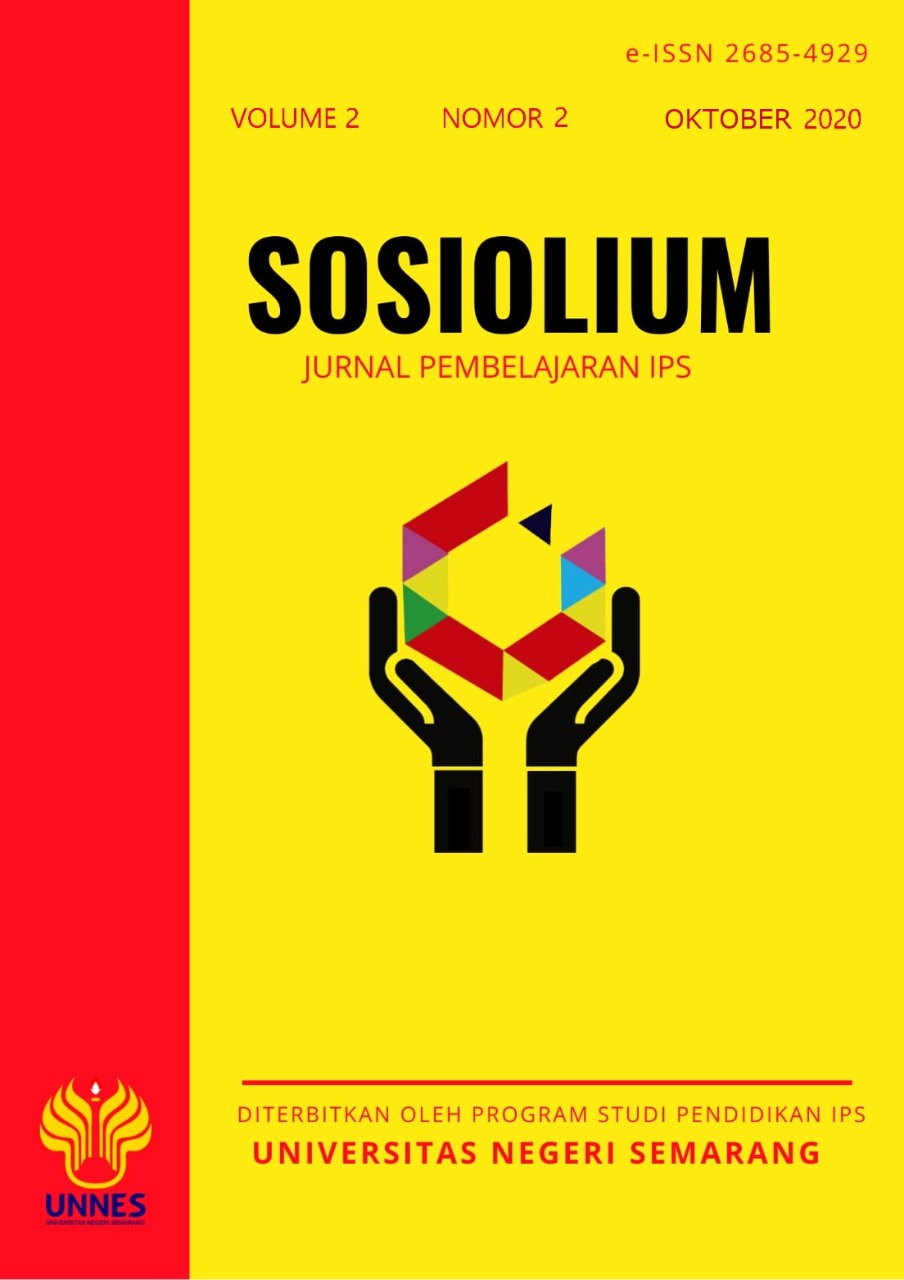Hubungan antara Persepsi Siswa tentang Kompetensi Pedagogik Guru dengan Hasil Belajar Siswa Kelas VII pada Mata Pelajaran IPS di SMP Ma’arif NU 01 Pekuncen, Banyumas Tahun Pelajaran 2018/2019
##plugins.themes.academic_pro.article.main##
Abstract
The competency possessed by the teacher affects the attention of students in participating in the learning process which will produce student learning outcomes. This type of research used in this research is quantitative research. The results of this study are the relationship between students' perceptions of teacher pedagogical competence with the learning outcomes of seventh-grade students of social studies at SM Ma'arif NU 01 Pekuncen, Banyumas Regency, Academic Year 218/2019 there is a positive and significant relationship between the two variables. This is evidenced by the obtained correlation value of the two variables is 0.943 with a significance of 0.000 and the student's perception variable about teacher pedagogical competence is related to the learning outcome variable by 88.9%.
##plugins.themes.academic_pro.article.details##

This work is licensed under a Creative Commons Attribution-NonCommercial-ShareAlike 4.0 International License.
All writings published in this journal are personal views of the authors and do not represent the views of this journal and the author's affiliated institutions. Author(s) retain copyrights under the license of Creative Commons Attribution-NonCommercial-ShareAlike 4.0 International (CC BY-NC-SA 4.0).
References
Arikunto. S. (2010). Prosedur Penelitian Suatu Pendekatan Praktik. Jakarta: Rineka Cipta.
Buchori & Trianto. (2007). Model Pembelajaran Terpadu dalam Teori dan Praktik. Jakarta: Prestasi Pustaka.
Cahyani, F. D., & Andiani, F. (2014). Hubungan Persepsi Siwa Terhadap Kompetensi Pedagogik, Konpetensi Kepribadian, dan Kompetensi Sosial Guru dengan Motivasi Beprestasi Siswa Akselerasi di SMA Negeri Gresik. Jurnal Psikologi Pendidikan, 3(2).
Hamalik, O. (2002). Pendidikan Guru Konsep dan Strategi. Bandung: Mandar Maju.
Hermuningsih, S., & Wardani, K. (2016). Persepsi Mahasiswa Terhadap Metode Simulasi Online Trading di Bursa Efek Indonesia di Faultas Ekonomi Yogyakarta. Jurnal EKOBIS, 17(2), 199-207.
Karlina, E., & Iswadi. (2018). Pengaruh Persepsi Siswa atas Fasilitas dan Kompetensi Pedagogik Guru Terhadap Hasil Belajar Ekononmi Pada Siswa SMA N 21 Bekasi. Research and Development Journal of Education, 4(2).
Mulyasa. (2013). Uji Kompetensi Guru dan Penilaian Guru. Bandung: PT Remaja Rosdakarya.
Nafisah, K., Margunani., & Latifah, L. (2015). Faktor-Faktor Yang Mempengaruhi Hasil Belajar Akuntansi Siswa Kelas XI Program Keahlian Akuntansi SMK Negeri 2 Semarang. Economic Education Analysis Journal.
Puskur. (2006). Kurikulum Tingkat Satuan Pendidikan. Jakarta: Depdiknas.
Rifai, A., & Anni, C. T. (2002). Psikologi Pendidikan. Semarang: Unnes Press.
Sadirman, A. M. (2006). Interaksi dan Motivasi Belajar Mengajar. Jakarta: PT Raja Grafindo Persada.
Sapriya. (2011). Pendidikan IPS Konsep dan Pembelajaran. Bandung: PT Remaja Rosdakarya.
Slameto. (2013). Belajar dan Faktor-Faktor yang Mempengaruhinya. Jakarta: Rineka Cipta.
Sudiami, D. (2018). Penerapan Model Example Non Example Sebagai Upaya Meningkatkan Motivasi dan Hasil Belajar IPS di SMP Negeri 1 Batang. Harmony, 3(2).
Sudijono, A. (2014). Pengantar Evaluasi Pendidikan. Jakarta: PT Raja Grafindo Persada.
Sugiyono. (2015). Metode Penelitian Pendidikan (Pendidikan Kuantitatif, Kualitatif dan R&D. Bandung: CV Alfabeta.
Sunaryo. (2004). Psikologi untuk Pendidikan. Jakarta: EGC.
Suprayogi. (2011). Pendidikan Ilmu Sosial. Semarang: Widya Karya.
Suryosubroto, B. (2009). Proses Belajar Mengajar Di Sekolah. Jakarta: PT Rineka Cipta.
Susanto, A. (2013). Teori Belajar dan Pembelajaran di Sekolah Dasar. Jakarta: Kencana Prenada Media Group.
Wahyudi, L., Kuncoro, T., & Dardiri, A. (2018). Pengaruh Kinerja Pedagogik Guru dan Kondisi Lingkungan Terhadap Minat Kerja dan Dampaknya pada Hasil Belajar Siswa SMK. Jurnal Teknologi dan Kejuruan, 41 (1), 55-66.
